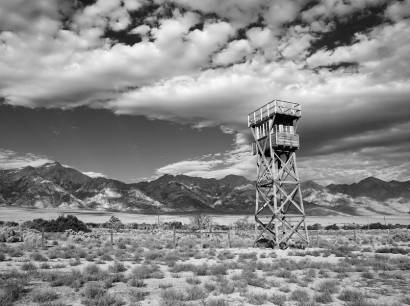This Week's Story
subscribe to podcast [click here] or play audio below
Yasutaka and his family are forced to live at an internment camp in California, because they are Japanese-American during World War II.

This Week’s Story relives American history and the Bible through brief inspiring stories presented on mp3 audio recordings and text for reading.
Betrayal, part one
A desert dust storm was swirling outside as Yasutaka, one of my senior students, opened our classroom door at Manzanar War Relocation Center.
“Miss Penner, may I talk to you?”
“Yes. Please come in.”
He dipped his head respectfully. He was tense and I felt his anxiety.
“Miss Penner, my family does not understand the United States government questionnaire. My parents are confused and feel humiliated. We have been told that the loyalty of every Japanese person in the United States is being questioned.”
“Yasutaka, I respect your family. I wish with all my heart that I could stop the injustice being received by the Japanese, whose homes and lives are in the United States.
“I think about the fear that was unleashed last year when Japan bombed Pearl Harbor December 7, 1941. The next day the United States Congress declared war against Japan. Three days later Germany
and Italy declared war against the United States. Those were five days of tremendous shock! Americans were afraid that enemies in submarines might come from Japan and attack the west coast. People thought that enemies might be hiding among us.
“I do not believe, Yasutaka, that the Japanese people here, whether or not they are American citizens, should be treated as enemies. That thinking has led to you and over 110,000 Japanese aliens and Japanese American citizens being forced to live in ten internment camps. Families have lost their homes and businesses. Which questions on this government questionnaire are the hardest for you and your family to answer?”
“Miss Penner, every Japanese person in an internment camp, age seventeen or older, must sign the questionnaire. Question 27 is: ‘Are you willing to serve in the armed forces of the United States on combat duty, wherever ordered?’
“I want to answer ‘yes.’ I am an American citizen, a Japanese American citizen. Japanese women, the elderly, and aliens do not understand why they must answer the question. If they answer ‘no,’ will that mean that they cannot be trusted?
“Question 28 asks if the signer will swear unqualified allegiance to the United States and refuse to give allegiance to the Japanese emperor. Many families are disagreeing between themselves about how to answer it. I will answer ‘yes.’ My parents have lived in the United States for twenty years. They have wanted to be citizens, but the government will not allow them or any Japanese person to become a citizen, except by being born here. My parents are afraid that if they answer ‘yes,’ they will be citizens of no country. What legal rights will they have then?”
My conversation with Yasutaka made me angry. I felt pinned against a wall of opinion. I had been frustrated since the government announced that the Japanese people on the West Coast were being placed in camps. During 1942 when the camps were being built, I announced to my mother. “I’m applying to teach at the Manzanar War Relocation Camp.”
She asked, “Sweetheart, what can you do?”
“I can help provide a classroom where students are respected and challenged. Their education must be as good as at public schools outside the camp.”
“Why is this important to you, Sarah?”
“Mom, our fears are betraying people and our Constitutional rights as citizens.”
This is Barbara Steiner. I need to interrupt this story, but it will continue soon. Please check out: thisweeksstory.com.
<< previous story] [next story >>
We invite your comments! [click here to comment]
This Week's Story is a non-profit supported by listeners. [click here to make a donation]
